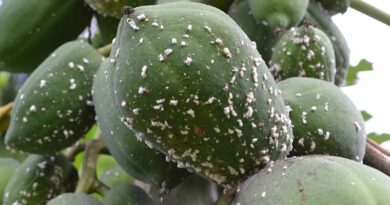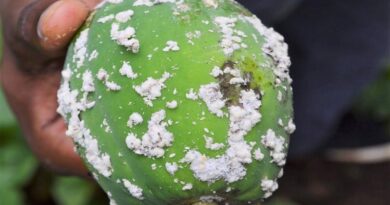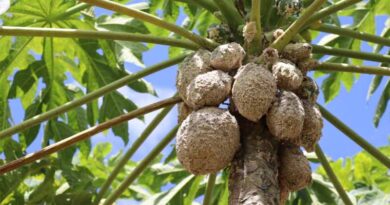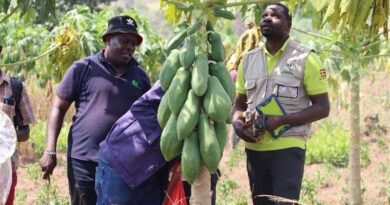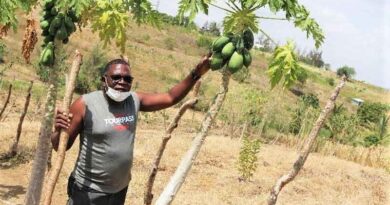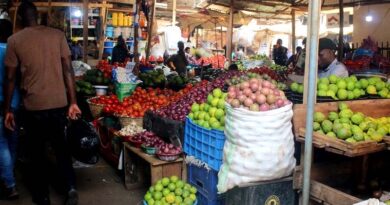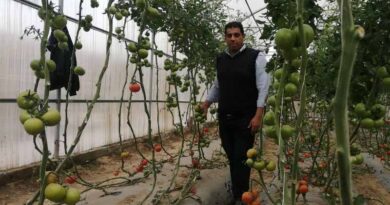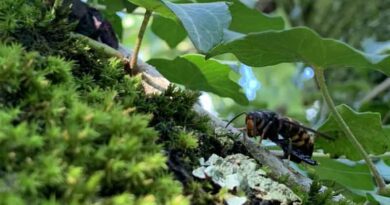Study shows “strong evidence of exceptional efficiency” of biological control agent against papaya mealybug pest
02 November 2023, Africa: A CABI-led study has revealed “strong evidence of exceptional efficiency” of a biological control agent in the fight against the papaya mealybug (Paracoccus marginatus) which threatens papaya crops in Kenya and other parts of Africa.
The researchers, who outlined their findings in the journal Crop Protection, found that female parasitoids play a pivotal role in pest control through host feeding or oviposition, leading to the reduction of papaya mealybug (PMB) populations.
Accordingly, CABI scientists and colleagues from Kenya Plant Health Inspectorate Service (KEPHIS), Kenya Agricultural and Livestock Research Organization (KALRO), and Kenyatta University, said Acerophagus papayae is a “good candidate” to control PMB which, in Kenya, causes crop losses ranging from 53-100%.
Serious threat to major papaya growing counties in Kenya
CABI, KEPHIS and KALRO estimate the value of the crop losses to be £2,224/ha annually and as such the PMB poses a serious threat to all 10 of the major papaya growing counties in Kenya including Meru, Murang’a, Kitui, Busia and Baringo.
PMB originated from Central America before spreading to the Caribbean and South America in the 1990s. It was first detected in Africa in 2010 in Ghana and in Mombasa County, Kenya, in 2016.
However, A. papayae offers a classical biological control remedy for PMB that should be part of an Integrated Pest Management (IPM) plan for PMB. This reduces the overreliance on chemical insecticides that are harmful to use and more damaging for the environment.
The scientists highlight how A. papayae – a small parasitic wasp that attacks PMB by laying eggs in it – was imported from Ghana into the quarantine facility at KALRO and investigated to see how successful it could be in controlling the papaya pest.
The researchers sought to evaluate the ability of the species to parasitize PMB after it was released at six papaya farms in the coastal region of Kenya between December 2021 and November 2022.
They studied the parasitism rates, sex ratio and development time of the parasitoid under choice and no-choice experimental conditions.
A. papayae established in all six research sites
Field-released A. papayae established in all six research sites within the coastal counties, with a parasitism rate of 30% or higher at all research sites within a month. The highest parasitism rate (72.89%) was recorded after more than 1,000 parasitoids were released on a farm, and parasitism was observed four months after releases.
Significant differences in host choice were noted when A. papayae was offered several host stages, with third instars being preferred over second instars. Adult females were preferred over third instars.
Dr Selpha Miller, lead author and Postdoctoral Research Fellow, Invasive Species Management at CABI, said, “The high parasitism rates and female-biased sex ratios obtained with third and adult female host instars indicate that mass rearing of A. papayae should be done with these host instar stages.
“A. papayae establishment in the field and parasitizing the mealybug to levels not detectable in the field has proved to be the most effective control strategy that should be implemented in Kenya and other Africa countries.”
Population counts of papaya mealybug reduced significantly
In most of the research sites, the population counts of papaya mealybug reduced significantly after releases to a level where it was difficult to find the pest at the research sites.
For the successful establishment of A. papayae, papaya farmers in the coastal region were encouraged to reduce the use of chemical pesticides to conserve parasitoids.
Apart from the releases at the research sites, additional papaya farms, which were part of a survey on knowledge, attitude, and practices perception of farmers towards classical biological control of papaya mealybug, were supplied with more parasitoids.
This was meant to ensure that the parasitoids established throughout the coastal region and helped suppress the population of papaya mealybug.
Female-biased sex ratio is generally more advantageous
Dr Miller added, “When evaluating biological control agents, the sex ratio is a crucial parameter that can impact the success of a biological control program. A female-biased sex ratio is generally more advantageous than a male-biased ratio because male parasitoids primarily focus on mating and do not contribute directly to pest mortality.
“The female parasitoids also play a pivotal role in pest control through host feeding or oviposition, leading to the reduction of pest populations. Therefore, a female-biased sex ratio is considered a positive attribute when assessing the effectiveness of biological control agents.”
The scientists added that most parasitism rates that were recorded to be above 40% in this study were reported after five months of establishment.
Natural Enemies Field Reservoir technology for mass rearing
It is hoped that Natural Enemies Field Reservoir (NEFR) technology, pioneered by the late CABI scientist Riaz Mahmood in Pakistan, will also prove fruitful in mass-rearing the parasitoid against papaya mealybug in Kenya.
NEFRs have been used in Pakistan as part of a separate USAID-funded Phytosanitary Risk Management programme in Sindh, Balochistan, Gilgit and Skardu where the conservation of important biocontrol agents of papaya mealy bug, apple pests, fruit flies and the giant mealy bug are being carried out.
Also Read: Godrej Agrovet launches new chilli pesticide Rashinban in India
(For Latest Agriculture News & Updates, follow Krishak Jagat on Google News)


